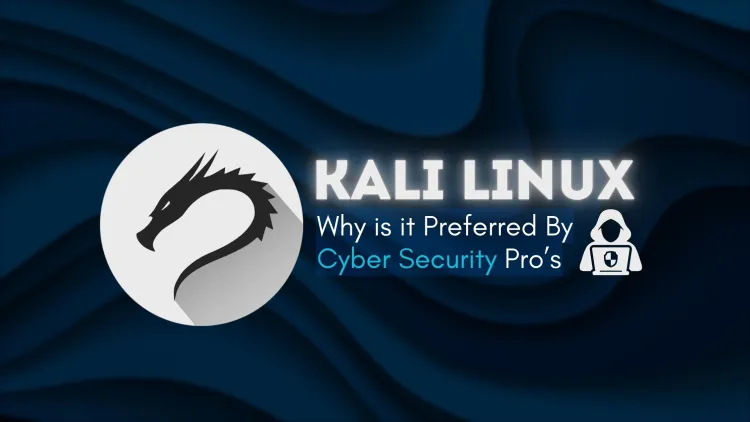Why Is Kali Linux Preferred by Cybersecurity Professionals?
Kali Linux is widely preferred by cybersecurity professionals for its pre-installed security tools, customizability, frequent updates, and strong community support. Purpose-built for penetration testing, ethical hacking, and security auditing, Kali Linux provides a robust environment for tackling security challenges. It’s free, open-source, and supports multiple platforms, making it the ideal choice for professionals seeking effective, efficient tools for vulnerability testing and security assessments.

Kali Linux is one of the most popular and widely used Linux distributions for cybersecurity professionals, penetration testers, ethical hackers, and security researchers. Known for its robust tools and advanced capabilities, Kali Linux offers everything needed to conduct security assessments and improve the defense mechanisms of systems. But why exactly do cybersecurity professionals prefer Kali Linux over other Linux distributions? This blog explores the main reasons for Kali Linux's popularity in the cybersecurity community.

1. Pre-Installed Security Tools
Kali Linux is equipped with more than 600 pre-installed security tools for penetration testing, vulnerability scanning, exploitation, forensics, and more. These tools cover a wide range of security-related tasks, making Kali the go-to distribution for ethical hackers. Some of the popular tools include:
- Metasploit Framework: A widely-used exploitation tool.
- Nmap: A powerful network scanner for discovering hosts and services.
- Wireshark: A network protocol analyzer.
- Aircrack-ng: A suite of tools for Wi-Fi network security testing.
- Burp Suite: An integrated platform for testing web application security.
The availability of these tools in a single distribution saves time and effort for cybersecurity professionals, as they don't need to install individual tools separately.
2. Customizable and Flexible
Kali Linux is highly customizable, allowing cybersecurity professionals to tailor the environment according to their specific needs. It offers:
- Live Booting: Kali Linux can be run as a live USB or CD, meaning you don’t need to install it to perform security assessments. This feature is especially useful when performing assessments on compromised systems or when anonymity is important.
- Lightweight Design: Kali’s minimalistic design ensures that the system remains efficient and doesn't consume unnecessary resources, making it suitable for a wide variety of hardware.
- Support for ARM Devices: Kali Linux runs on various ARM devices, such as Raspberry Pi, BeagleBone, and others, providing flexibility for penetration testing in smaller or specialized environments.
Cybersecurity professionals can create a setup tailored to their particular work environment, optimizing their workflow.
3. Constant Updates and Active Community
Kali Linux is regularly updated to stay current with new security threats, vulnerabilities, and patches. It is maintained and supported by Offensive Security, the creators of Kali Linux, who frequently release updates and new versions. In addition, the Kali Linux community is vibrant and active, allowing cybersecurity professionals to share tips, tools, and experiences.
- Security Updates: Kali Linux constantly updates its tools to ensure penetration testers have access to the latest methods and exploits.
- Official Documentation: The detailed and comprehensive documentation provided by Offensive Security helps cybersecurity professionals get the most out of their tools and learn new techniques.
The ongoing development and active community provide invaluable support, making it easier for cybersecurity professionals to stay ahead of emerging threats.
4. Built for Penetration Testing
Kali Linux is purpose-built for penetration testing and digital forensics, meaning its design and structure are optimized for these tasks. The inclusion of tools and configurations tailored for hacking, auditing, and assessing system vulnerabilities makes it easier for professionals to perform in-depth analysis and execute complex attacks. Key features include:
- Network scanning tools for assessing system security.
- Exploitation frameworks for launching simulated attacks.
- Forensics tools for analyzing digital evidence and investigating compromised systems.
Unlike general-purpose Linux distributions, Kali Linux is specifically designed with cybersecurity in mind.
5. Open-Source and Free
Kali Linux is open-source and free to use, making it accessible to both individual users and organizations. Professionals can download, modify, and distribute the system without any licensing fees. The open-source nature of Kali also means that:
- Transparency: Users can review the code for security vulnerabilities.
- Customization: Professionals can modify the source code to suit specific needs.
- Collaboration: Contributions from developers around the world help improve the system and add new features.
This flexibility and cost-effectiveness make Kali Linux an attractive option for both newcomers and seasoned cybersecurity experts.
6. Support for Multiple Platforms
Kali Linux supports a wide range of hardware platforms and is available for multiple architectures, including x86, x64, ARM, and more. This makes it versatile and allows it to be used in a variety of environments. For example:
- Raspberry Pi: Kali Linux can run on Raspberry Pi, making it ideal for mobile penetration testing setups or use in low-resource environments.
- Virtual Machines: Professionals can run Kali Linux on virtual machines (VMs), which allows for testing in isolated environments without affecting production systems.
This flexibility across platforms enables cybersecurity professionals to conduct penetration testing in diverse scenarios.
7. Robust Documentation and Training Resources
Kali Linux offers extensive documentation and training resources to help cybersecurity professionals understand and use its features effectively. The official documentation includes detailed guides, tutorials, and examples for using each of Kali's tools. Additionally:
- Offensive Security Courses: For those seeking in-depth knowledge, Offensive Security offers certification courses such as the Offensive Security Certified Professional (OSCP), which focuses on ethical hacking and penetration testing using Kali Linux.
- Community Forums and Blogs: Kali Linux has an extensive online community where users can share tips, tricks, and troubleshooting advice.
These resources help cybersecurity professionals stay up-to-date and enhance their penetration testing skills.
8. Strong Focus on Security
Kali Linux is designed with security as its top priority. It follows strict security practices, such as:
- Non-root by Default: The default installation of Kali requires the user to work with limited user privileges rather than root. This prevents accidental system changes and reduces risks.
- Built-in Security Tools: The distribution includes a variety of tools specifically designed to enhance security testing and vulnerability analysis.
This focus on security ensures that cybersecurity professionals can safely and efficiently conduct their work without worrying about damaging the underlying system.
9. Large Collection of Vulnerable Targets
Kali Linux includes a variety of intentionally vulnerable systems and targets for testing and training purposes. Tools like Metasploit, OWASP Juice Shop, and Damn Vulnerable Web Application (DVWA) provide a safe and legal environment for testing penetration techniques and improving skillsets. These systems offer real-world scenarios, allowing professionals to practice on simulated attacks and challenges.
10. Ideal for Ethical Hacking
Kali Linux is widely used for ethical hacking because it allows professionals to test the security of networks and systems legally and effectively. By using Kali’s tools, cybersecurity experts can simulate real-world attacks to identify vulnerabilities before malicious hackers exploit them. Kali is also a go-to choice for:
- Red Teaming: Simulating attacks to assess defenses.
- Security Auditing: Scanning systems for vulnerabilities.
- Incident Response: Analyzing system breaches and compromises.
Kali’s ability to run numerous security tools helps ethical hackers ensure systems and networks remain protected.
Conclusion
Kali Linux is the preferred choice for cybersecurity professionals due to its comprehensive set of pre-installed tools, high level of customization, open-source nature, and security-focused design. Its versatility across platforms, constant updates, and strong community support make it a go-to operating system for penetration testing, ethical hacking, and security research. Whether you are a seasoned expert or a beginner in the cybersecurity field, Kali Linux provides everything needed to stay ahead in the world of security.
FAQs
-
What makes Kali Linux different from other Linux distributions?
- Kali Linux is specifically designed for penetration testing, ethical hacking, and cybersecurity tasks, providing more than 600 pre-installed security tools, unlike general-purpose distributions.
-
What tools come pre-installed in Kali Linux?
- Kali Linux includes tools for various security tasks, such as Metasploit, Nmap, Wireshark, Aircrack-ng, Burp Suite, and many more for penetration testing, network analysis, and exploitation.
-
Can Kali Linux be used for ethical hacking?
- Yes, Kali Linux is widely used for ethical hacking due to its comprehensive suite of penetration testing tools and its focus on security.
-
Is Kali Linux free to use?
- Yes, Kali Linux is open-source and free to download, install, and use.
-
What makes Kali Linux secure?
- Kali Linux is built with security as a priority, featuring tools designed for testing system vulnerabilities, a non-root default installation, and strong encryption options.
-
Can Kali Linux be installed on a virtual machine?
- Yes, Kali Linux can be installed and run on a virtual machine, allowing penetration testers to create isolated environments for security testing.
-
What platforms does Kali Linux support?
- Kali Linux supports a wide range of platforms, including x86, x64, ARM devices (e.g., Raspberry Pi), and virtual environments.
-
How often does Kali Linux receive updates?
- Kali Linux is regularly updated with new tools, patches, and security fixes. Updates are available through its repository, and the community constantly adds new features.
-
Can I use Kali Linux for digital forensics?
- Yes, Kali Linux includes several tools specifically designed for digital forensics, including file carving, data recovery, and evidence analysis tools.
-
How do I learn to use Kali Linux for penetration testing?
- Kali Linux provides extensive documentation and resources. Additionally, Offensive Security offers certifications such as the OSCP (Offensive Security Certified Professional) to help individuals enhance their ethical hacking skills.











![Top 10 Ethical Hackers in the World [2025]](https://www.webasha.com/blog/uploads/images/202408/image_100x75_66c2f983c207b.webp)

![[2025] Top 100+ VAPT Interview Questions and Answers](https://www.webasha.com/blog/uploads/images/image_100x75_6512b1e4b64f7.jpg)









